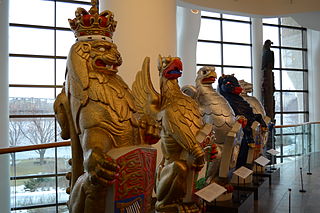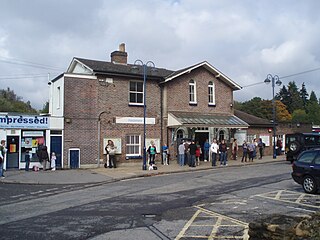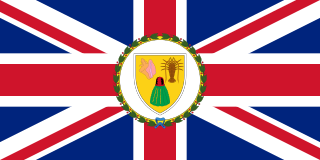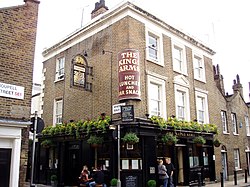Waterloo most commonly refers to:

The Most Noble Order of the Garter is an order of chivalry founded by Edward III of England in 1348. The most senior order of knighthood in the British honours system, it is outranked in precedence only by the decorations of the Victoria Cross and the George Cross. The Order of the Garter is dedicated to the image and arms of Saint George, England's patron saint.

The University of Waterloo is a public research university with a main campus in Waterloo, Ontario, Canada. The main campus is on 404 hectares of land adjacent to uptown Waterloo and Waterloo Park. The university also operates three satellite campuses and four affiliated university colleges. The university offers academic programs administered by six faculties and thirteen faculty-based schools. Waterloo operates the largest post-secondary co-operative education program in the world, with over 20,000 undergraduate students enrolled in the university's co-op program. Waterloo is a member of the U15, a group of research-intensive universities in Canada.

Duke of Gloucester is a British royal title, often conferred on one of the sons of the reigning monarch. The first four creations were in the Peerage of England and the last in the Peerage of the United Kingdom; the current creation carries with it the subsidiary titles of Earl of Ulster and Baron Culloden.

The coat of arms of the United Kingdom, also referred to as the royal arms, are the arms of dominion of the British monarch, currently Charles III. They are used by the Government of the United Kingdom and by other Crown institutions, including courts in the United Kingdom and in some parts of the Commonwealth. Differenced versions of the arms are used by members of the British royal family. The monarch's official flag, the Royal Standard, is the coat of arms in flag form.

The coat of arms of England is the coat of arms historically used as arms of dominion by the monarchs of the Kingdom of England, and now used to symbolise England generally. The arms were adopted c.1200 by the Plantagenet kings and continued to be used by successive English and British monarchs; they are currently quartered with the arms of Scotland and Ireland in the coat of arms of the United Kingdom. Historically they were also quartered with the arms of France, representing the English claim to the French throne, and Hanover.

The Right Honourable the Lord Lyon King of Arms, the head of Lyon Court, is the most junior of the Great Officers of State in Scotland and is the Scottish official with responsibility for regulating heraldry in that country, issuing new grants of arms, and serving as the judge of the Court of the Lord Lyon, the oldest heraldic court in the world that is still in daily operation.

The Queen's Beasts are ten heraldic statues representing the genealogy of Queen Elizabeth II, depicted as the Royal supporters of England. They stood in front of the temporary western annexe to Westminster Abbey for the Queen's coronation in 1953. Each of the Queen's Beasts consists of a heraldic beast supporting a shield bearing a badge or arms of a family associated with the ancestry of Queen Elizabeth II. They were commissioned by the British Ministry of Works from the sculptor James Woodford, who was paid the sum of £2,750 for the work. They were uncoloured except for their shields at the coronation. They are now on display in the Canadian Museum of History in Gatineau, Quebec.

Haslemere railway station is on the Portsmouth Direct Line, serving the town of Haslemere, Surrey, England. It is 42 miles 79 chains (69.2 km) down the line from London Waterloo, measured via Woking.

The governor of the Turks and Caicos Islands is the representative of the British monarch in the United Kingdom's British Overseas Territory of Turks and Caicos Islands. The Governor is appointed by the monarch on the advice of the British government. The role of the governor is to act as the vice-regal representative of the head of state, His Majesty King Charles III. The Governor appoints the Premier and 5 members of the House of Assembly. The official residence of the governor is the Government House of Turks and Caicos Islands, located in Waterloo on the island of Grand Turk.

Norroy and Ulster King of Arms is the provincial King of Arms at the College of Arms with jurisdiction over England north of the Trent and Northern Ireland. The two offices of Norroy and Ulster were formerly separate. Norroy King of Arms is the older office, there being a reference as early as 1276 to a "King of Heralds beyond the Trent in the North". The name Norroy is derived from the Old French nort roy meaning 'north king'. The office of Ulster Principal King of Arms for All-Ireland was established in 1552 by King Edward VI to replace the older post of Ireland King of Arms, which had lapsed in 1487.

London Buses route 176 is a Transport for London contracted bus route in London, England. Running between Penge and Tottenham Court Road station, it is operated by Go-Ahead London.

The Lion's Mound is a large conical artificial hill in the municipality of Braine-l'Alleud, Walloon Brabant, Belgium. King William I of the Netherlands ordered its construction in 1820, and it was completed in 1826. It commemorates the spot on the battlefield of Waterloo where the king's elder son, Prince William of Orange, is presumed to have been wounded on 18 June 1815, as well as the Battle of Quatre Bras, which had been fought two days earlier.
The Treaty of Casalanza, which ended the Neapolitan War, was signed on 20 May 1815 between the Napoleonic Kingdom of Naples on the one hand and the Austrian Empire, as well as the Great Britain, on the other. The signature occurred in a patrician villa, owned by the Lanza family, in what is now the commune of Pastorano, Campania, southern Italy.

The Yorkshire Grey was a common name for public houses in England, some still survive but most have now closed or changed their name. They were named for the Yorkshire Grey Horse, a breed commonly used to pull brewery drays.
King's Arms, or Kings Arms or The King's Arms may refer to:

The Old Kings Arms is a public house at 7 George Street, St Albans, Hertfordshire, England. The timber framed building is fifteenth century and is listed Grade II with Historic England.

The Markham Arms is a former pub at 138 King's Road, London SW3. It closed as a pub in the early 1990s, and is now a branch of the Santander bank.

George Dames Burtchaell, KC, MA, LLB, MRIA, JP was an Irish genealogist.


















